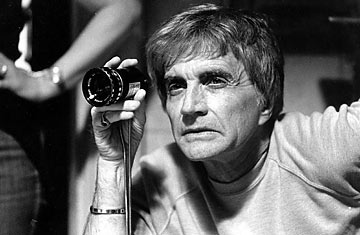
Film maker Blake Edwards on set in 1982.
(2 of 4)
Of Edwards's 29 acting credits listed on the Internet Movie Database, only six were prominent enough to earn him screen billing; Strangler of the Swamp, a below-low-budget rural melodrama, gave him a rare co-starring role. In 1949, realizing that he would not find fame in front of the camera, Edwards went into radio drama, then at the peak of its power. He created the series Richard Diamond, Private Detective, starring Dick Powell, the musical ingenue turned film-noir stud. Taking advantage of Powell's two strengths, Edwards made Diamond a singing detective, whistling the opening theme and crooning a song at the end. In the Philip Marlowe hard-boiled tradition — there were dozens on the air back then — Diamond spouted tough, ripe dialogue ("That guy gets shell-shocked if ya fry a potato") and jousted with thugs given florid verbiage ("You arouse my irascibility"). The series ran for four years on NBC radio; the TV version starring David Janssen, and in which Edwards did not participate, aired on CBS from 1957 to 1960.
In 1948, Edwards made his last film as an actor, billed sixth in a prizefight movie, Leather Gloves; the picture also marked the directorial debut of another young actor of slightly higher stature, Richard Quine. Edwards, then 24, and Quine, 26, formed a director-screenwriter tandem, and together they made B-minus programmers for pop singer Frankie Laine (Rainbow 'Round My Shoulder, Bring Your Smile Along) and fading superstar Mickey Rooney (All Ashore, Drive a Crooked Road). They created the character Rooney played on his 1954-55 NBC sitcom, Mickey; Edwards also wrote, and occasionally directed, scripts for Powell's anthology TV series Four Star Playhouse. As Quine the director moved to A pictures, Edwards the scripter went with him, working on the 1955 Jule Styne musical My Sister Eileen and the Army-comedy hit Operation Mad Ball, starring Lemmon, with Rooney in support. That was in 1957, by which time Edwards was ready to come out from under Quine's, Rooney's and Hollywood's shadow.
He got going with Mister Cory, starring Tony Curtis as a professional gambler, a character he would parlay into a one-season TV series, Mr. Lucky (also based on the 1943 Cary Grant film of the same name). Then, returning to his Richard Diamond roots, he created Peter Gunn, a nourish TV series about a dapper private eye (Craig Stevens) with a sultry chanteuse girlfriend (Lola Albright) and a stolid policeman pal (Herschel Bernardi). The opening scene of the pilot episode displays Edwards in full control of the program's tone. A sedan full of mobsters is pulled over by a police car; but those aren't cops, they're killers, who blast away at everyone in the sedan, leaving one corpse leaning on a blaring car horn that would wake the neighbors of anyone watching the show. Cue Henry Mancini's pummeling jazz theme — what people mainly remember from Peter Gunn — and a long tracking shot of weathered faces at the mobster's funeral. The series enjoyed playing with noir cliches and against them: the new Mr. Big is a small, soft-spoken type, played by The Love Boat's Gavin McLeod.
Between writing and directing episodes of Peter Gunn over its three-year span, Edwards was helming hit movies: the Navy comedy Operation Petticoat, teaming Curtis with Cary Grant, and Tiffany's. which won Oscars for Mancini's score and the instant standard, "Moon River," he wrote with Johnny Mercer, plus three other nominations. The next year, Mercer and Mancini won another Oscar for their theme from Days of Wine and Roses, which also earned nominations for Lemmon and Remick. Though Edwards wasn't nominated as director (not then, not ever), he was cruising from hit to esteemed hit. He could have kept directing serious pictures in the Academy-approved fashion. Instead, he and Maurice Richlin fabricated an all-star farrago called The Pink Panther, featuring Sellers as the clueless French detective Inspector Jacques Clouseau. That character, propelled by another infectious Mancini tune, would bumble through 11 features, eight of them by Edwards, and a long-running series of cartoons. For better or worse, the Clouseau aesthetic defined the rest of Edwards's career.
KAMIKAZE KABUKI COMEDY
As with the Thin Man movies, the Pink Panther title had nothing to do with its main character: it was a diamond whose thief the Inspector was chasing. The film — a standard-issue comedy heavier on the Gallic glamour than on the abuse the clumsy Clouseau took and dished out — was a hit, and Edwards did a sequel, A Shot in the Dark, now with Sellers as the undisputed star. The actor and the director took a decade's hiatus from the character (Alan Arkin played Clouseau in a 1968 movie Edwards wasn't involved in), and reunited for The Return of... in 1975, ...Strikes Again in 1976 and Revenge of... in 1978.
